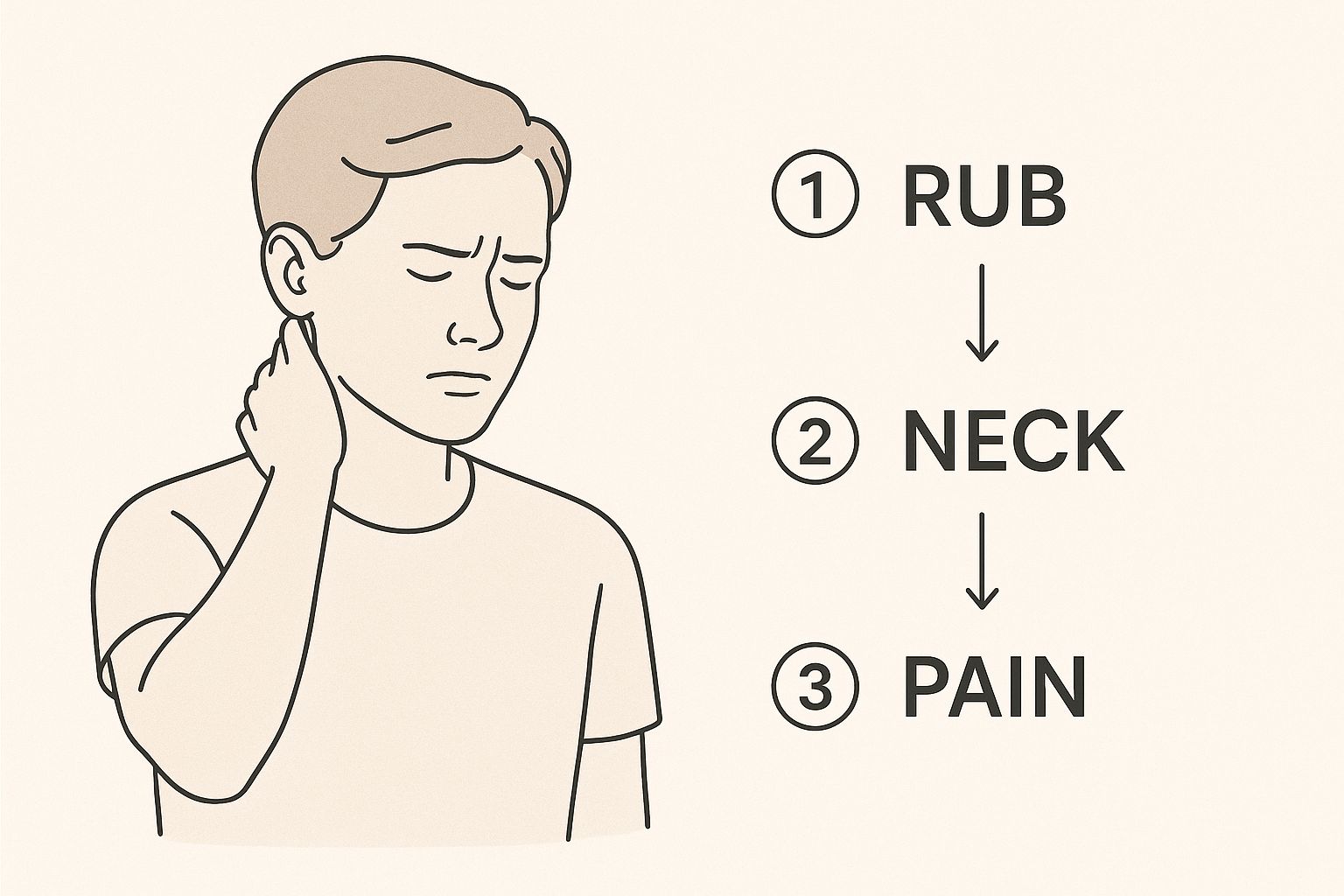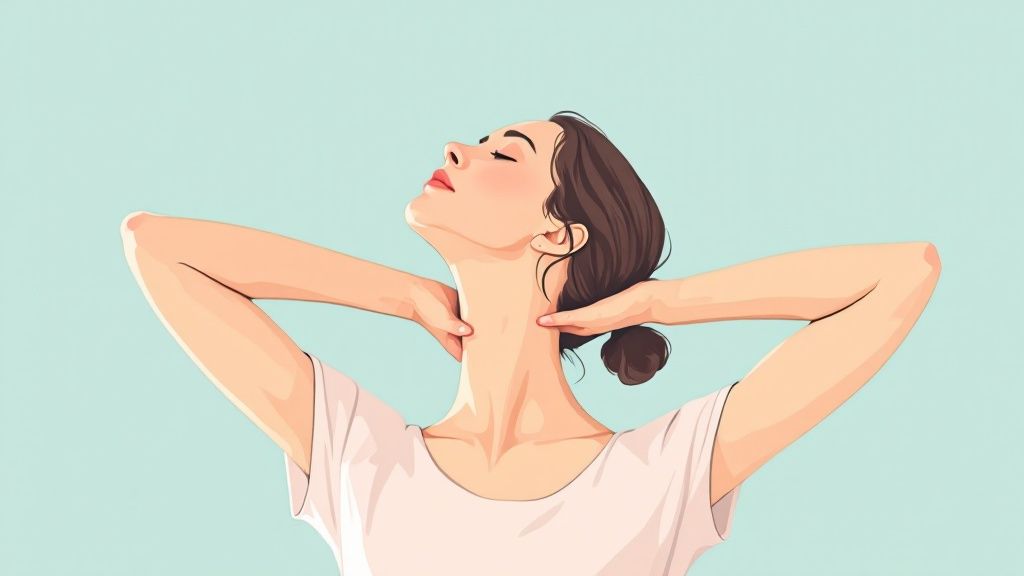That nagging ache in your neck? It isn't just in your head. It's a very real, physical signal from your mind. Anxiety neck pain is a direct result of your body kicking into its stress response, where constant muscle tension leads to genuine discomfort, stiffness, and pain. It’s a physiological reaction to emotional distress, plain and simple.
The Unseen Link Between Anxiety and Neck Pain
Have you ever noticed your shoulders slowly creeping up towards your ears during a stressful meeting? Or caught yourself clenching your jaw while stuck in traffic? These are small, almost unconscious physical reactions to stress, and they give us a perfect window into understanding anxiety neck pain.
When your mind senses a threat—whether it's a real danger or just a looming deadline—it triggers the body's ancient 'fight-or-flight' response. This survival mechanism floods your system with stress hormones like adrenaline and cortisol, prepping you to face whatever is coming. Your heart rate picks up, your breathing gets shallow, and, crucially, your muscles tense up, ready for action. The muscles in your neck and shoulders are especially prone to this, creating a sort of protective armour around your head and vital arteries.
From Temporary Tension to Chronic Pain
In a genuine emergency, this response is incredibly useful. The problem starts when the "threat" isn't a physical danger but chronic, ongoing anxiety. Your brain isn't great at telling the difference between a charging lion and persistent worry, so it keeps that fight-or-flight system switched on.
Imagine clenching your fist as tightly as you can. For a few seconds, it's no big deal. But what if you held it that way for hours, days, or even weeks? Your hand would ache, feel weak, and become incredibly sore. This is exactly what’s happening to your neck and shoulder muscles when they’re under the influence of chronic anxiety.
This constant state of high alert forces these muscles into a perpetual state of contraction. They never get a chance to properly relax, which kicks off a cascade of physical problems:
- Muscle Fatigue and Soreness: Just like any overworked muscle, they become exhausted. This leads to that familiar dull, throbbing ache.
- Reduced Blood Flow: Chronically tight muscles can squeeze down on blood vessels, restricting circulation. This starves the tissue of oxygen and essential nutrients, which only makes the pain and stiffness worse.
- Trigger Points: Small, painful knots of muscle fibre can develop. These "trigger points" can even refer pain to other areas, often causing tension headaches that start right at the base of your skull.
This connection isn't just something people talk about; it's a significant issue backed by research. Here in the UK, a surprising number of young adults experience neck pain that is closely tied to psychological factors. One study found that 74% of young adults reported neck pain associated with anxiety and depression, showing a clear statistical link.
If you're interested, you can explore the detailed findings about this connection between psychological motives and neck pain in young adults. It’s a powerful reminder that what you’re feeling is a common and recognised physical symptom of mental stress.
How Your Body Turns Stress into Physical Pain
To really get a handle on anxiety-related neck pain, we need to look under the bonnet and see what’s actually happening inside your body. The link isn't just a vague notion; it's a direct biological chain reaction where emotional stress physically manifests as real discomfort.
Think of it as your body's internal alarm system getting jammed in the "on" position.
When your brain senses a threat—whether it's a genuine danger or simply a wave of worry—it kicks off the classic fight-or-flight response. This floods your system with stress hormones, mainly cortisol and adrenaline. These chemicals are powerful messengers, telling your muscles to tense up and get ready for action. For your neck and shoulders, this means they tighten up and stay that way.
This constant muscle clenching is the main reason for that deep, nagging ache we associate with anxiety neck pain. When muscles stay tight for too long, they squeeze the blood vessels, restricting blood flow. Less blood means less oxygen and fewer nutrients getting to the muscle tissue, leading to soreness, fatigue, and a build-up of waste products that can cause inflammation.
This infographic gives a great visual of how a mental state like anxiety can set off a physical cascade that ends in a painful neck.

As you can see, the path from a simple worry to a physical ache is a complex one, involving everything from hormones to muscular strain.
The Role of Anxious Breathing
It's not just about the hormonal flood, either. The way you breathe when you're anxious makes a huge difference. Anxious breathing is typically shallow and rapid, coming from the chest instead of deep in your belly. This pattern overworks the smaller muscles in your neck and upper chest that are only supposed to help with breathing, not do all the heavy lifting.
These muscles aren't built for that kind of constant work. When they're forced to do the job of the diaphragm day in and day out, they get strained and tired. This leads to stiffness and pain that can travel all the way from your collarbone up to the base of your skull. It's a subtle but powerful part of the anxiety-neck-pain cycle.
"Posture doesn’t just reflect your mental state—it can amplify it. A study published in Health Psychology found that people who sat in upright postures during stressful tasks reported higher self-esteem, better mood, and less fear than those who slouched."
This just goes to show how physical habits driven by anxiety, like bad posture and shallow breathing, can create a feedback loop that makes both the emotional and physical feelings worse.
When Your Brain Turns Up the Pain Volume
Here’s where it gets really interesting: anxiety can actually change how your brain perceives pain. Your brain has its own built-in pain-dampening system, which is managed by chemicals like serotonin and endorphins. They act like natural painkillers, helping you tolerate discomfort.
But chronic stress and anxiety can throw this delicate system out of whack. High cortisol levels can interfere with how well these pain-regulating chemicals work. In short, anxiety turns down the volume on your body’s natural pain relief and cranks up the volume on the pain signals themselves.
So, you’re not just imagining it; the pain you feel is genuinely more intense. What might normally be a minor bit of stiffness gets amplified into a serious ache because your brain's filtering system isn't working properly. This effect, known as central sensitisation, can make you more sensitive to all kinds of pain.
This complicated dance between hormones, muscles, breathing, and brain chemistry is why you need a well-rounded approach to tackle anxiety neck pain. To find real relief, you have to address what's going on in both your mind and your body. If you're looking into holistic options, understanding these mechanics is the perfect place to start. You can also explore various natural remedies for anxiety that help support both your mental and physical wellbeing.
Recognising Anxiety-Driven Neck Pain Symptoms
How can you tell if that ache in your neck is from sleeping funny, or if it’s a physical signal from your mind? Working out the difference between mechanical pain and anxiety-driven neck pain is the key to finding real relief. While they can feel similar on the surface, anxiety neck pain often has a unique footprint that’s tangled up with your emotional state.
The first step is learning to recognise these specific symptoms. The discomfort is usually more than just a simple ache; it’s a whole collection of sensations that can rise and fall with your stress levels. It just feels different because its source isn't a single injury but a systemic state of tension.
The Physical Footprint of Anxiety
When anxiety is the root cause, the pain often shows up in specific ways. It’s rarely isolated to one tiny spot. Instead, it feels more spread out, creeping across your neck, shoulders, and sometimes even into your upper back.
Common physical signs include:
- Dull, Persistent Aching: This is the big one—a constant, nagging throb in the neck and shoulder muscles that just doesn't seem to shift.
- Sharp, Stabbing Pains: You might get sudden, sharp pains that come out of nowhere, especially during moments of high stress or when you move your head suddenly.
- Chronic Stiffness and Reduced Mobility: It might be tough to turn your head from side to side, or you might feel like your neck is “locked” in place. This is often worse in the morning or after sitting still for a long time.
- Tension Headaches: Many people get headaches that feel like they start at the base of the skull and wrap around the head like a tight band.
- Muscle Knots (Trigger Points): If you press on the big muscles between your neck and shoulders (your trapezius muscles), you might feel hard, sore knots that are tender to the touch.
The connection between chronic neck pain and anxiety is well-established. Here in the UK, research has shown a major overlap. One study looked at 80 patients with chronic neck pain and found that a massive 68.4% also had anxiety, highlighting a strong pattern where psychological distress directly cranks up the volume on physical pain. You can read the full research about the comorbidity of neck pain and anxiety to see the data for yourself.
Connecting Pain to Your Mental State
Perhaps the most telling sign of anxiety neck pain is how closely it mirrors your emotional wellbeing. The pain often acts like a barometer for your stress levels—it flares up during anxious periods and can ease off when you manage to find a moment of calm.
It's not just the physical sensations, either. You’ll probably notice psychological symptoms that go hand-in-hand with the pain.
For instance, a day filled with constant worry or finding it hard to focus is often followed by a night of intense neck stiffness. This isn't a coincidence; it's a direct reflection of your mental state showing up physically.
This connection is a two-way street. The relentless pain can, in turn, make your anxiety worse. It creates a nasty cycle where the pain fuels your worry, and that worry tightens your muscles even more, intensifying the pain.
Anxiety Neck Pain vs Mechanical Neck Pain
To help you figure out what you're dealing with, it’s useful to compare the typical signs of anxiety-related neck pain with mechanical pain—the kind you get from an injury, bad posture, or a physical strain.
Here's a quick comparison to help you pinpoint the likely source of your discomfort.
Anxiety Neck Pain vs Mechanical Neck Pain
| Symptom | Anxiety-Related Neck Pain | Mechanical Neck Pain |
|---|---|---|
| Onset | Tends to come on gradually, with no obvious cause other than a period of high stress. | Usually linked to a specific event, like an awkward movement, an injury, or sleeping wrong. |
| Feeling | Often a generalised, dull ache that spreads across the shoulders and neck, sometimes with sharp jolts. | More likely to be a sharp, localised pain that you can point to in one specific area. |
| Triggers | Gets worse during stressful or anxious moments and may feel better when you are relaxed. | Gets worse with certain physical movements and often improves with rest or gentle stretching. |
| Duration | Can be chronic and stick around for days or weeks, especially during long bouts of anxiety. | Is usually acute, getting better within a few days or a week with the right care. |
By paying close attention to how and when your neck pain shows up, you can get some valuable clues about its root cause. If you notice your pain levels rising and falling with your daily stress, that’s a pretty strong indicator that you’re dealing with anxiety neck pain.
Actionable Strategies for Mind and Muscle Relief
Knowing the link between your mind and muscles is the first step, but now it's time to take back control. Breaking the cycle of anxiety-related neck pain means tackling it from two angles: calming your nervous system while also releasing all that physical tension. Think of these natural, practical strategies as your personal toolkit for soothing both mind and body.

The great thing is, many of these techniques can be slipped into your day with hardly any disruption. The aim isn't to pile more stress onto your schedule but to weave small moments of relief into your existing routine, creating a lasting path toward feeling better.
Calming the Nervous System with Mindful Breathing
When anxiety hits, your breathing instinctively becomes shallow and quick, which directly tightens up your neck muscles. Diaphragmatic breathing, often called "belly breathing," is a fantastic way to hit the brakes on this process. It works by activating your parasympathetic nervous system—your body’s own built-in relaxation response.
Here’s a simple exercise you can do absolutely anywhere:
- Get Comfortable: Sit up straight in a chair with your feet flat on the floor, or lie on your back with your knees bent.
- Place Your Hands: Rest one hand on your upper chest and the other on your belly, just below your ribs.
- Inhale Slowly: Breathe in gently through your nose for a count of four. As you inhale, let your belly rise and push your hand up. Your chest should stay fairly still.
- Hold for a Moment: Pause and hold your breath for a count of two.
- Exhale Fully: Breathe out slowly through your mouth for a count of six, feeling your belly gently fall.
Practising this for just five minutes a day can start to retrain your breathing patterns. It helps lower stress hormone levels and sends a clear "all clear" signal to your brain, which in turn tells your neck muscles it’s safe to relax.
Releasing Tension with Gentle Neck Stretches
Muscles that are constantly tight need a bit of gentle persuasion to let go. These stretches are specifically designed to target the muscles in your neck and shoulders that take the brunt of anxiety. Just remember to move slowly and listen to your body—never push into sharp pain.
- Ear-to-Shoulder Tilt: Sitting tall, gently lower your right ear towards your right shoulder. Hold for 15-30 seconds, feeling a nice, easy stretch along the left side of your neck. Switch sides and repeat.
- Chin-to-Chest Tuck: Gently drop your chin down towards your chest, holding for 15-30 seconds to stretch the back of your neck.
- Shoulder Blade Squeeze: Whether sitting or standing, keep your arms by your sides and squeeze your shoulder blades together, like you're trying to hold a pencil between them. Hold for 10 seconds, then release. Do this 5-10 times.
Performing these gentle stretches two to three times throughout your workday can prevent tension from building up, effectively interrupting the cycle before the pain becomes severe. It’s a small investment of time for a significant return in comfort.
The Power of Therapeutic Heat and Massage
Applying warmth to your neck and shoulders is a simple but incredibly effective way to soothe tight muscles. A warm compress, heat pad, or even just a hot shower can boost blood flow to the area. This brings more oxygen and nutrients to the muscle tissue and helps wash away inflammatory by-products, helping your muscles relax and reducing stiffness.
Self-massage can also offer immediate relief. Using your fingertips, apply gentle but firm pressure to the tight spots in your neck and shoulders. Use small, circular motions, paying extra attention to any knots you find. This not only works on the muscle fibres but also acts as a grounding mindfulness practice, bringing your awareness back to your body in a caring way.
These physical tricks do more than just manage symptoms; they actively break the feedback loop where physical pain fuels mental anxiety, and vice-versa. Finding natural ways to manage discomfort is key for long-term well-being. If you're looking into different options, our guide on CBD for pain relief offers more insights into science-based, natural approaches.
Optimising Your Environment with Ergonomics
Finally, take a look at how your surroundings might be making things worse. Poor posture, especially from sitting at a desk or staring down at a phone for hours, forces your neck muscles into a strained position. This physical stress is like adding fuel to the fire of anxiety-related tension.
A few simple ergonomic tweaks can make a massive difference:
- Monitor Height: Adjust your computer screen so the top is at or just below your eye level.
- Chair Support: Make sure your chair supports the natural curve of your lower back. This helps align your entire spine properly.
- Phone Habits: Be mindful of "text neck." Try holding your phone up closer to eye level instead of constantly looking down at it.
By creating a more supportive physical environment, you reduce the baseline strain on your neck muscles. This gives them a better shot at relaxing and makes them less vulnerable to the tightening effects of anxiety. When you combine all these practical strategies, you've got a powerful, multi-faceted approach to managing and overcoming anxiety neck pain.
Considering CBD as a Complementary Approach
When you’re trying to untangle something as complex as anxiety-driven neck pain, it makes sense to look beyond the usual fixes. Alongside things like mindfulness and physical therapy, lots of people are now exploring complementary options to help get the mind and body back on the same page. One that keeps popping up is cannabidiol, or CBD.
It’s important to be clear: CBD isn’t a magical cure. Think of it more as a supporting player in your overall wellness strategy. For a problem that has both mental and physical roots, you need a toolkit that can tackle both sides. That’s where CBD gets interesting, as its potential effects seem to touch on both areas, offering a two-pronged approach that really fits the problem.
How CBD Interacts with Your Body
So, how might CBD actually help? To get it, we need to talk about your body’s endocannabinoid system (ECS). Picture the ECS as your body's internal balancing act, a massive network of signals and receptors working quietly in the background to keep everything running smoothly. From your mood and sleep patterns to how you feel pain, the ECS is involved in keeping it all in equilibrium.
When you're constantly stressed, this system can get thrown out of whack, which can lead to heightened anxiety and pain. CBD steps in and interacts with the ECS, not by forcing it to do anything, but by gently encouraging it to work more efficiently. It's less like a sledgehammer breaking down a door and more like a skilled mechanic giving your engine a much-needed tune-up.
This unique interaction is why CBD is being looked at for its potential to help with both the emotional and physical side of things. By giving your ECS a bit of support, it may help your body better manage its reaction to the stress that’s causing that pain in your neck.
Targeting Anxiety and Inflammation
When we zoom in on anxiety neck pain, CBD’s potential benefits fall into two main camps. First up is its possible calming effect on an overactive mind. Some research suggests CBD might influence serotonin receptors, which are key players in regulating mood and anxiety. By helping to smooth out these pathways, CBD could help dial down the constant worry that keeps the pain cycle going.
Second, CBD is well-known for its anti-inflammatory properties. That relentless muscle tension in your neck and shoulders often leads to inflammation, which is what causes the soreness and stiffness. CBD may help to reduce this inflammation at a cellular level, which could soothe those tight, overworked muscles and bring some real physical relief.
Chronic pain is a huge issue across the UK, and it’s often deeply intertwined with mental health. The 2017 Health Survey for England found that chronic pain is widespread, with 24% of sufferers pointing specifically to neck or shoulder pain. But here’s the crucial bit: the data also showed that a staggering 65% of people whose pain seriously interfered with their lives also reported suffering from anxiety or depression.
This powerful statistic really drives home the need for approaches that can help with both physical aches and mental distress. If you want to dig deeper, you can discover more insights from the national chronic pain report to see just how connected they are.
Choosing Quality and Seeking Advice
The CBD market can feel like the Wild West, so it’s absolutely vital to prioritise quality and safety. Always look for products that are third-party lab tested. This is your proof that an independent lab has verified what’s in the bottle, ensuring it has the advertised amount of CBD and is free from any nasty contaminants. In the UK, it also confirms there's no detectable THC, the compound that gets you 'high'.
It’s also incredibly important to have a chat with a healthcare professional before you start taking any new supplement, including CBD. They can give you proper advice on whether it’s a good fit for you, especially if you have other health conditions or are taking medication. For a bit more background, our guide on how CBD oil can help with anxiety offers some extra detail. Taking this step ensures you’re looking after yourself safely and effectively.
Building Your Personal Pain Management Plan
Knowing is one thing, but doing is where you'll find real relief. The key isn't some intense, once-in-a-while effort. It's about weaving small, consistent habits into your everyday routine to create a sustainable, long-term strategy for managing that nagging pain. This is how you start to take back control over both your mind and your muscles.

The goal here is to become the expert on your own body. Start paying closer attention. Pinpoint your specific anxiety triggers and how your pain responds. Does your neck tighten up after a stressful meeting? Or maybe while you’re scrolling through your phone? Making these connections is the crucial first step to breaking the cycle.
Once you know what sets it off, you can build a personalised routine that actually works for you.
Creating a Simple Daily Structure
A proactive plan doesn't have to be complicated. When it comes to managing anxiety neck pain, consistency is way more powerful than complexity. Just think of it as threading little moments of self-care into the fabric of your day.
Your simple weekly framework could look something like this:
- Mindful Mornings: Kick off your day with five minutes of guided meditation or some deep belly breathing. This sets a calm tone before the day's stress has a chance to grab hold.
- Movement Breaks: Set a timer on your phone to remind you to get up and do a few gentle neck stretches every hour. This is a game-changer for stopping tension from building up, especially if you sit for long periods.
- Ergonomic Check-ins: A couple of times a day, maybe at lunch and again in the afternoon, do a quick posture check. Are your shoulders hunched up by your ears? Is your screen at eye level? Little adjustments make a big difference.
By taking a proactive, integrated approach to both mind and body, you have the power to manage your anxiety neck pain and reclaim your quality of life. The journey is about consistent, compassionate self-care.
For a bit of targeted physical relief, especially after a long day, topical applications can be a fantastic addition to your plan. If you're looking at different options, our CBD topical guide offers insights on transforming your skin with targeted relief and might complement your other strategies well. Just remember, every small, positive action you take builds momentum toward lasting comfort and peace.
Common Questions About Anxiety Neck Pain
When you’re trying to get your head around anxiety-induced neck pain, a lot of questions can pop up. Let's tackle some of the most common ones to give you a clearer picture of what you're dealing with and how to find a way forward.
Can Anxiety Neck Pain Feel Like a Serious Problem?
Yes, absolutely. The physical symptoms anxiety can dish out are often surprisingly intense and can easily be mistaken for something more sinister.
You might be feeling sharp, shooting pains or a deep, unrelenting stiffness that's genuinely alarming. This happens because chronic muscle tension can start to pinch nerves or even trigger nasty headaches that creep up from the base of your skull. The pain is very real, and it’s definitely not "all in your head."
While anxiety is the trigger, it’s always a good idea to chat with your doctor to rule out any other medical issues. This is especially true if the pain is severe, just won't quit, or if you start noticing numbness or weakness.
It’s so important to validate what you’re feeling. Acknowledging that the pain is a real, physical response to stress is the first step. It empowers you to find the right kind of help that treats both your mind and your body together.
How Long Does Anxiety Neck Pain Usually Last?
There's no single answer to this one, unfortunately. The duration of the pain is almost always tied directly to how you're managing the underlying anxiety.
- Short-term stress: If your neck pain is linked to a specific stressful event, you might find it eases up within a few days once things calm down.
- Chronic anxiety: For those dealing with ongoing anxiety, the neck pain can become a constant, unwelcome companion that sticks around for the long haul.
Lasting relief really comes down to consistency. When you regularly practise things like mindfulness, gentle stretching, and making small ergonomic adjustments to your workspace, you'll start to see a change. Most people find the pain becomes less frequent and intense within a few weeks of sticking to a solid management plan.
Will Painkillers Help My Anxiety Neck Pain?
Over-the-counter painkillers like ibuprofen can certainly take the edge off on a bad day. They can help reduce inflammation and dull the ache, which gives you a bit of temporary breathing room. The problem is, they don’t touch the root cause – the anxiety itself.
Relying only on pills is a bit like putting a plaster on a leaky pipe; it’s a short-term fix. A much better long-term strategy is to combine mind-body techniques to lower your anxiety with physical therapies like stretching and heat packs to release all that pent-up muscle tension. This integrated approach tackles the problem from every angle, giving you a much better shot at sustainable relief.
For those looking to build a comprehensive wellness plan, exploring natural, supportive options can make a real difference. SMOKO CBD offers premium, UK-made CBD products designed to help manage anxiety and soothe persistent pain, providing a complementary approach to your wellness journey. Discover our lab-tested CBD oils and topicals at https://smokocbd.com.









